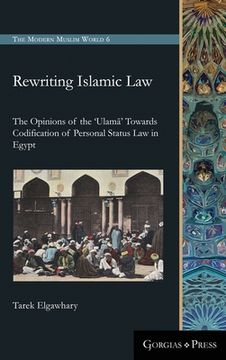Compartir
Rewriting Islamic Law: The Opinions of the 'Ulamā' Towards Codification of Personal Status Law in Egypt (en Inglés)
Tarek Elgawhary
(Autor)
·
Gorgias Press
· Tapa Dura
Rewriting Islamic Law: The Opinions of the 'Ulamā' Towards Codification of Personal Status Law in Egypt (en Inglés) - Elgawhary, Tarek
$ 2,482.63
$ 4,513.88
Ahorras: $ 2,031.25
Elige la lista en la que quieres agregar tu producto o crea una nueva lista
✓ Producto agregado correctamente a la lista de deseos.
Ir a Mis Listas
Origen: Estados Unidos
(Costos de importación incluídos en el precio)
Se enviará desde nuestra bodega entre el
Lunes 22 de Julio y el
Viernes 02 de Agosto.
Lo recibirás en cualquier lugar de México entre 1 y 3 días hábiles luego del envío.
Reseña del libro "Rewriting Islamic Law: The Opinions of the 'Ulamā' Towards Codification of Personal Status Law in Egypt (en Inglés)"
The codification process of personal status laws in Egypt began in the mid-1800s, continuing until the abolition of the Sharī'a courts in 1955, with the absorption of personal these statutes into the newly drafted civil code and the national courts that administered them. Throughout this period, legal codification entailed finding appropriate rulings from the annals of Islamic law and structuring these rulings using the model and language of European legal codes, usually the French code. Prior to this, the area of personal status law was the exclusive domain of the 'ulamā' and the Sharī'a. In Egypt, personal status laws were exclusively based on Ḥanafī law, and issues surrounding the consolidation and codification of these laws first took place within the framework of classical Islamic law, not outside of it. To understand the significance of the process of codification, therefore, it is important to examine the attitudes of the 'ulamā' regarding it and its place within the edifice of Islamic law. Furthermore, since the 'ulamā' themselves are a diverse group, it is also important to understand the various approaches adopted to the process of codification to fully appreciate the great significance it had on the re-formatting and re-writing of Islamic law. "Sharia codification in the 19th and 20th centuries is an important chapter in the story of Islamic law and modernity. The author is an accomplished scholar, trained in both Western academia and at the al-Azhar Seminary, and has done a wonderful job of narrating and analyzing this historic process." H.E. Dr. Ali Gomaa, Former Grand Mufti of Egypt. "A fascinating and meticulously-researched study highlighting the tensions in turning shari'ah personal status laws into state law in Egypt during the twentieth century" HRH Prince Ghazi Bin Muhammad of Jordan.
- 0% (0)
- 0% (0)
- 0% (0)
- 0% (0)
- 0% (0)
Todos los libros de nuestro catálogo son Originales.
El libro está escrito en Inglés.
La encuadernación de esta edición es Tapa Dura.
✓ Producto agregado correctamente al carro, Ir a Pagar.

